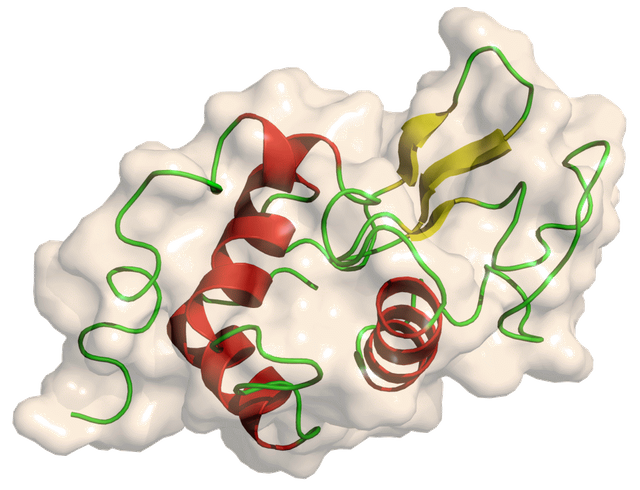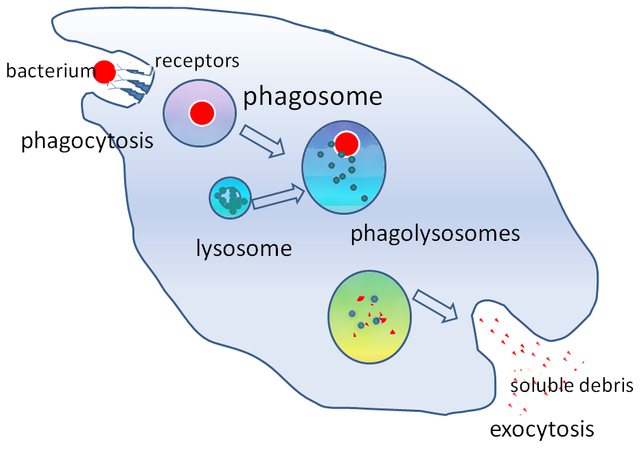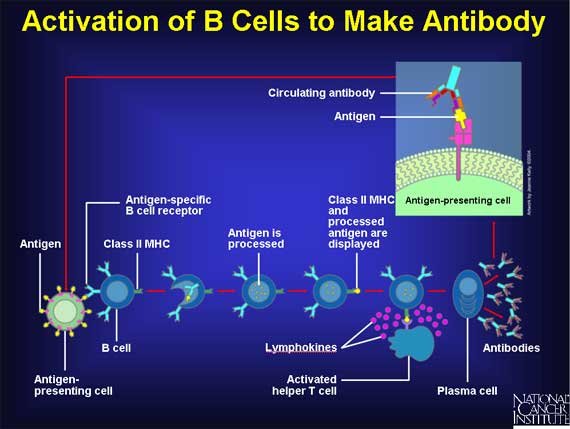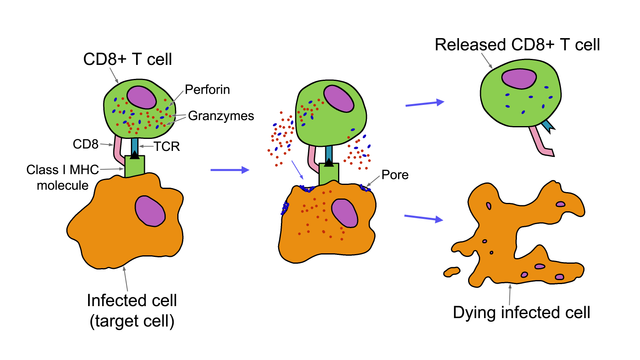Ingested Microbe and Immune Response
It was 9:09 PM on Tuesday (two days ago). I had missed lunch that day and I was so hungry. My room was "void" of light. I needed to feed the Ascaris lumbricoides in my intestine, as their rumbling noise of “save-our-soul” cries could be clearly heard. That is to say I was hungry “inside-out”. Putting a little stoichiometry into use, I began to mix up every food ingredient I could lay my hands on in an attempt to prepare concoction rice (in Nigeria, this means a pseudo jollof rice).
One of the ingredients needed was a sachet of tomato paste. I could have open up and use a new paste sachet but, I remembered I had used one two days before and a little quantity was left in the sachet, which I had kept “safe” (not from spoilage organisms as in using a refrigerator, but rats in a sealed bowl).
I retrieved the left over paste out from where I kept it. With the believe that it should still be “okay to use”, I squeezed its content into my pot, and without checking it, I sucked away the little paste left around the tip of the sachet and probably together with some paste left in the sachet.While enjoying the fine texture of the paste, I felt my tongue meeting with few lumps, then I was shocked. The paste was two or more days old! And as a microbiologist, the only thing I could imagine was that I had lumps of spoilage organism(s) right in my mouth. I ran to fetch a torch, removed the lump from my mouth and inspected it. I did guessed right, it was a lump of microbial growth. I almost vomited all I had in my gastrointestinal tract.
It was like swallowing the contents of a 48 hours overgrown plate of bacterial culture.
I felt like I had introduced disease causing microbes into my system. What would happen? Should I expect an intestinal infection or an oral type? In how many days should I expect to see symptoms? I had loads of questions popping up in my mind at once. But I am a microbiologist, first I needed to know what kind of organism could be responsible for tomato paste spoilage, then to understand some of the possible outcomes, and what will be the fate of the newly introduced spoilage organisms in my system. To answer these questions, I started a research.
Please join me on this flight as we discuss the most probable answers below.
Just like many other organisms, one of the macro requirements for microbial growth is the availability of water as an intrinsic factor in a growth medium. Tomato (Lycopersicon esculentum) has high water activity and so are a good food substrate for growth of spoilage organisms. The question that followed then, was that “what type of spoilage organism was I dealing with?” Was it bacteria or fungi? Which of these two will most likely cause tomato spoilage?
Food substrates with high water activity are more likely to be spoiled by fungi sooner than bacteria. Abhinaba (2018) in his article titled “Identification of Microorganisms responsible for Spoilage of Tomato” reported that fungi was the cause of most spoilage of tomato rather than bacteria. The dominating fungi genera in his study were Aspergillus and Fusarium, with Aspergillus niger been the pronounced spoilage fungi of tomato source.
However, in 2005, Kalyoncu, et al., reported that in addition to A. niger, Alternaria alternata species where found to be most dominant fungi causing tomato paste spoilage source.
If I am to agree with the discoveries from these two studies on tomato and tomato paste spoilage, then that means I had a loop-full of probably Aspergillus niger or Alternaria alternata to deal with.
I had swallowed fungal cells!
Aspergillus is a producer of a class of toxins called “mycotoxins”, which out of many other harmful effect it has on humans, it is carcinogenic. “I am in trouble!” I exclaimed. So what happens, how does my body react or respond to this foreign intruder?
Antifungal activity of lysozyme in the mouth
Chewing food in the mouth, mixes it with saliva which contains digestive enzymes and secretions like lysozyme.
Lysozyme is a part of the innate immune system. It is well known for its antibacterial activities. But studies has shown that it has some level of antifungal properties. Woods, et al. (2011) reported antifungal activities of lysozyme against some fungal species source. Hence, lysozyme secretions from my saliva must have dealt a first blow on the fungi.What if the fungal cells were able to evade the action of lysozyme secreted by my saliva? Then they would have to face the wrath of my intestinal innate immune system and afterward, my adaptive immune system. No means of escape for those trespassers!
Immune Response to the Fungal Cells
The innate immune system, simply defined, includes every part of the human body involved in nonspecific fight or resistance against foreign invaders. They are the first line of defence against any intruder. It is a wide topic to talk about, so I will limit this write up to two types of cells of the innate immune system which I believe are very much involved in fighting against the swallowed fungal cells.
Dendritic cells and macrophages are phagocytic immune cells. They capture foreign microbes and destroy them through a process called phagocytosis, which means “death by ingestion”. They are spread throughout the body, and so are present in large numbers in the intestine.
These cells are capable of recognizing foreigners in the system through molecular pattern recognition using their pattern recognition receptors (PRR) such as NOD-like receptors and Toll-like receptors which bind to Pathogen-Associated Molecular Patterns (PAMPs) on the microbial cells. After binding takes place, the phagocytic cell extends its cell membrane, ingests the microbial cell, which then becomes a phagosome (a cell ingested by another cell).
Once inside the phagocyte, the microbial cell is exposed to lysing action of the lysosome, which releases lot of enzymes that attacks the ingested microbe from all sides. The result is an intracellular digestion of the microbe meaning they are “grinded” into “pieces” and then can be excreted from the cell through exocytosis or sent to the endoplasmic reticulum to undergo processing for it to be presented to cells of the adaptive immune system, in which case they (dendrititc cells and macrophages) are called Antigen-Presenting Cells (APC). This is a bridge that connects the innate immunity to adaptive immunity.If the fungal cells are not entirely destroyed by phagocytosis as described above, they will be subjected to the brutality of the adaptive immunity!
The adaptive immune system includes cells and antibodies involved in specific immunity. They are said to be an acquired form of immunity as they are developed in response to antigens (any substance that can be recognized as foreign and also trigger immune response). Two types of immune cells are more involved in this type of immunity. They include B-Cells and T-Cells. Macrophages and dendritic cells present processed “leftovers” of the “phagocytosized” microbe as antigens on their membranes through their Major Histocompatibility Complex (MHC) to B-Cells and T-Cells and cause the activation of these adaptive immune cells.
An activated B-Cell will then proliferate and differentiate into memory B-Cells (which “forever” remembers the antigen that caused its activation) and plasma cells which secretes antibodies specific for the antigen that was presented to the parent B-Cell. These antibodies attack and cause the destruction of any remaining microbial cell from which the antigen came or which carries the antigen.
On the other hand, activated T-Cells (especially the CD8 + T-Cells proliferate and differentiate into memory T-cells, cytotoxic T lymphocytes (CTL) and regulatory T cells (Treg).
The CTLs also known as cytotoxic T cells, express receptors specific for the antigen that caused their activation on their membrane. They look for these antigens (which will be expressed by the microbial cell). When they find the cell bearing it, they attack and cause the cell to die by apoptosis (programmed cell death) through the release of granzymes and perforins that make holes in the microbial cell.With all these lined up soldiers ready to battle foreign invaders at any time, I think I am safe from infection that could have risen from the ingested fungal cells.
We take in microorganism everyday especially through the oral route, which is our mouth. The intentions of these organisms was not to cause us harm in any way but, as a result of a change in habitat, their way of life (by-products of metabolism, and secretions) are found to be alien to their new home. This exactly is where the problem starts. A problem of settling in the new home leading to alterations that the home (our body) cannot cope with, and so, disease results. Hence, the need for us to ensure an active immunity always.
Avoiding stress as much as possible is one good way to maintain an active immune system. Because, when we are down with stress, they immune system will not be as active as it should. Secondly, let us try to include in our diet foods that “boost” the activity of the immune system, particularly orange and other citrus fruits. Being given to too much alcohol can also affect the activity of these protecting system.
I will keep you posted if I eventually experience some symptoms of infection arising from the microbial cells I ingested. And please, do watch out for whatever is intended to go into your mouth. Do not be like me!
Thanks for reading!
References
- Fungi are more responsible for tomato spoilage
- Alternaria alternata
- Antifungal activity of lysozyme
- Sherwood, L., Willey, J. and Woolverton, C. 2013. Prescott’s Microbiology (9th ed.). New York: McGraw Hill. pp. 741-784.




Very educational post. I found Many interesting information. Thanks for share.
I am glad I could share "interesting" information. Thanks
I always wondered whether due to them technically being a lipid in nature that in situations of starvation that if they get churned into ketones whether that "memory" is lost :(
Thanks for stopping by. memory B-Cells cannot be used up by the body during starvation. The memory lasts for virtually the individual's lifetime.
That’s a madness never could wrap my head around the specificity of what the body will destroy and keep in times of need great article btw
When you see an article written by a braniac, one need not tell you, you will definitely know.
The pictures of those t-cell and b-cell activation made a lot of things very easy.
Nice one
I am humbled with this comment. Thank you for stopping by @cyprianj
Hi @herbayomi!
Your post was upvoted by utopian.io in cooperation with steemstem - supporting knowledge, innovation and technological advancement on the Steem Blockchain.
Contribute to Open Source with utopian.io
Learn how to contribute on our website and join the new open source economy.
Want to chat? Join the Utopian Community on Discord https://discord.gg/h52nFrV
You really swept me off my feet. Microorganisms are destructive, and their deleterious effect on the defense mechanism of human body should not be allowed. Thanks @herbayomi for educating us
I agree with you Sir. But I must say, microorganisms actually never intended to bring us harm in any way. "Change of habitat" is the source of any problem between us (Microbe and humans). Thanks for this comment Sir.
😁
That got me laugh out aloud. Your post is mixed up with funny gestures and facts. You made us learn new things while making it feel like we are watching comedy movies. You are indeed a genius @herbayomi.
Lesson learnt and I must say I really love this. Thank you for giving us this educating article.
I am @teekingtv and I write STEM.
Hahaha... I am glad you found it interesting and educative. Thanks for this comment, I am motivated.
Congratulations @herbayomi! You have completed some achievement on Steemit and have been rewarded with new badge(s) :
Click on the badge to view your Board of Honor.
If you no longer want to receive notifications, reply to this comment with the word
STOPDo not miss the last post from @steemitboard!
Participate in the SteemitBoard World Cup Contest!
Collect World Cup badges and win free SBD
Support the Gold Sponsors of the contest: @good-karma and @lukestokes
Indeed, u're a genius. A very thrilling, compelling and creative post. I've learnt a lot from this especially in the aspect of always watching out for whatever we put in our stomach. I'll be more cautious and observant now. Who knows what I might have ingested cos for like 2days now I've been frequenting the toilet to defecate. Only God knows what i ate though.
lolzzzz.
Brilliant work once again, bro.
My boss, It's my pleasure you learned from this post. Yes, we have to be very watchful of what goes in into our mouths. Haha, try to use flagyl o. Thanks for your comment Sir, You do inspire me to do better.
@herbayomi, I'm still laughing from all the humor infused in your article...
When I see posts like this, I scout for something to "take home" from it and I'm glad I found it.
The power of fruits and vegetables on the immune system still amazes me... This was definitely worth my time.
@amazonaesh I am delighted you were able to get a thing or two from this short write up. Thanks for taking your time to read through. Continue to "encourage" the immune system to fight more and better!
Congratulations @herbayomi! You have completed some achievement on Steemit and have been rewarded with new badge(s) :
Click on the badge to view your Board of Honor.
If you no longer want to receive notifications, reply to this comment with the word
STOPDo not miss the last post from @steemitboard!
Participate in the SteemitBoard World Cup Contest!
Collect World Cup badges and win free SBD
Support the Gold Sponsors of the contest: @good-karma and @lukestokes